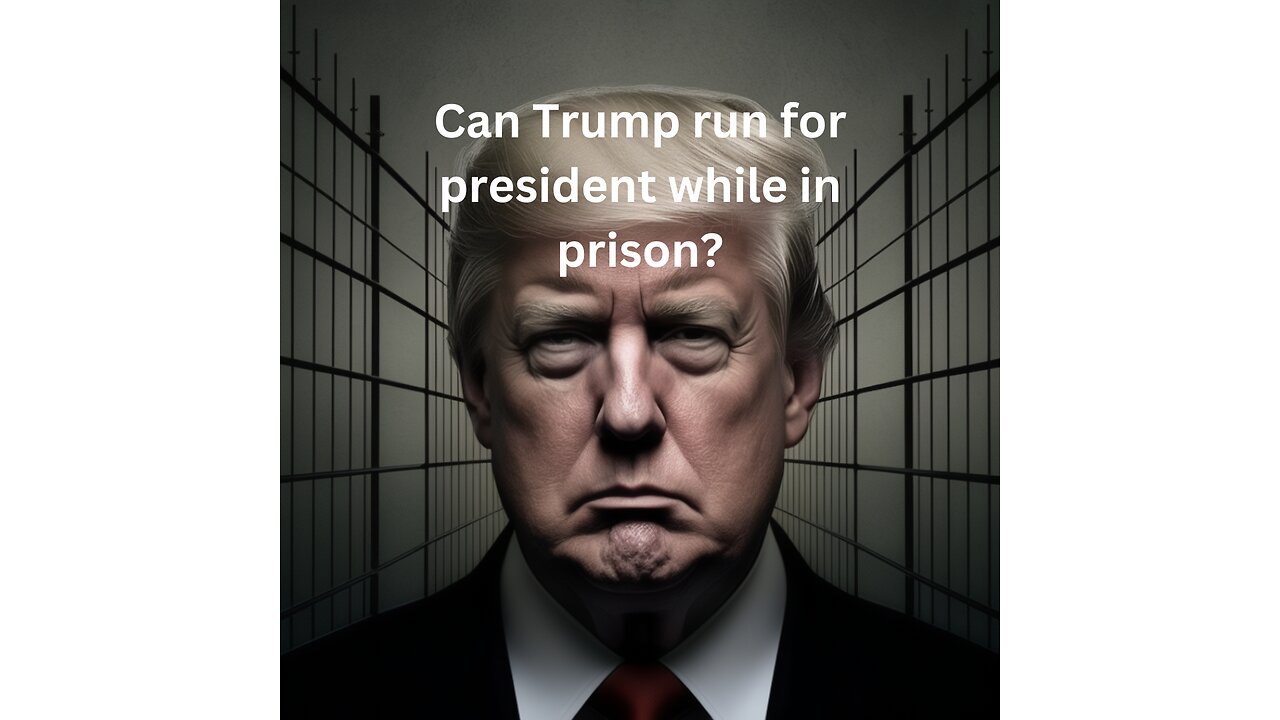Premium Only Content

Trump's Legal Battle: Could He Serve as President from Prison?
For the first time in history, a presumptive presidential nominee from one of the two major U.S. political parties is a convicted felon. Donald Trump’s conviction in the Manhattan hush money case does not prevent him from running for — and potentially serving — as president. The requirements for federal office, as outlined in the U.S. Constitution, are straightforward: the president must be at least 35 years old, be a natural-born U.S. citizen, and have lived in the U.S. for at least 14 years. Criminal convictions are not mentioned.
Trump, the leading contender for the 2024 presidential nomination, faces potential prison time, which could create practical complications if he wins the presidency. Running the country from a cell is implausible, and some legal experts suggest that a constitutional crisis might ensue, potentially leading to his sentence being suspended to allow him to fulfill his duties as president. The judge in the hush money case has yet to deliver Trump’s sentence, which could range from no jail time to up to four years behind bars.
While Trump is the first felon candidate with a feasible chance of winning the presidency, he is not the first criminal to run for the office. In 1920, Eugene V. Debs, the Socialist Party nominee, campaigned while serving a 10-year federal sentence for urging resistance to the World War I draft. Debs received 3% of the popular vote, a respectable number but not enough to force the nation to address the improbable constitutional question of an imprisoned candidate winning the presidency.
A Trump victory from behind bars would present significant constitutional challenges. Legal scholars generally believe that the necessity for a duly elected president to fulfill the duties of office would override a criminal conviction, likely requiring the sentence to be put on hold. If Trump were convicted of a federal crime, he could even attempt to pardon himself immediately upon taking office, a maneuver Debs also promised if he had won.
Seton Hall law professor Eugene Mazo remarked, “Then we’re just going to get into uncharted waters. I don’t think we have an answer to this.” Debs’ case, much like Trump’s situation now, raises the question: Can a person run for president, or be elected president, after being convicted of a crime or even while in jail? The answer, both then and now, appears to be yes.
“There’s nothing barring Trump from running. Even a federal conviction doesn’t prevent that,” explained a legal scholar. “The Supreme Court has said what’s in the Constitution are the only requirements you need to run for federal office.”
-
 1:56
1:56
Conspiracy Chronicle
1 month agoMysterious Drones Over New Jersey: Are They Hunting for Nuclear Radiation?
1242 -
 1:26:43
1:26:43
Game On!
10 hours ago $0.16 earnedThe Debate is OVER! It was ALL Brady, not Belichick!
9.21K1 -
 17:53
17:53
Producer Michael
20 hours agoI'VE NEVER SEEN SO MANY LIMITED EDITION WATCHES!
33.4K9 -
 12:04
12:04
SOFTDRINKTV
12 hours ago $8.82 earnedAre NBA 2K's Graphics Getting Worse?
80.4K7 -
 30:54
30:54
World Nomac
19 hours agoSurprising honest locals in Tondo Philippines with rewards 🇵🇭
43.9K1 -
 49:30
49:30
CarlCrusher
14 hours agoAlien Abductions with Magic Wands?
29.8K11 -
 5:46
5:46
America First Policy Institute
16 hours agoSchool Choice Empowering Parents, Transforming Futures America First Policy Institute #schoolchoice
17.6K3 -
 1:00:40
1:00:40
PMG
18 hours ago $3.87 earnedNo Security for Fauci & Was It Known That the mRNA COVID Vaccines Would Cause Cancer?
25.2K23 -
 3:17:30
3:17:30
Price of Reason
17 hours agoTrump Makes Waves! Disney Captain America HATES America! Selena Gomez MELTDOWN! Ubisoft CRUMBLES!
76.6K8 -
![[Tekken Tuesday] Its Time! Buckle Up Butter Cup!](https://1a-1791.com/video/fwe2/36/s8/1/I/U/S/e/IUSex.0kob-small-Tekken-Tuesday-Its-Time-Buc.jpg) 8:16:12
8:16:12
CHiLi XDD
15 hours ago[Tekken Tuesday] Its Time! Buckle Up Butter Cup!
108K5